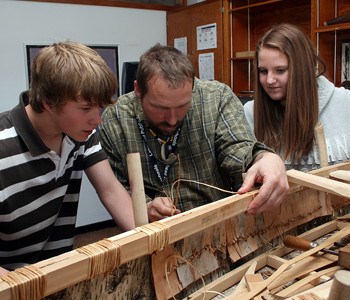Bradley Beecken says building a birch-bark canoe in class this year has
taught him an important lesson: kids of his generation have it a heck of
a lot easier than the kids of two or three centuries ago.
“It makes you realize back then life was a whole lot easier than it
is compared to now,” the 13-year-old Algonquin Avenue Public School
Grade 8 student said on Thursday afternoon, as he and classmate Tamara
Albanese showcased the miniature canoe for Fort William Historical Park
staff. The park sponsored the program and helped them create podcasts
that will document their efforts in years to come.
“Now we have cars. Back then they had canoes,” he said,
acknowledging that his parents aren’t building their cars like
aboriginal parents built their modes of transportation in earlier times.
The process also taught the students about the importance of
aboriginal culture and their ways of life, sending them out into the
bush to collect the resources they need and encouraged them to read
about the role the canoe, one of the seven wonders of Canada, played in
the country’s foundation.
“We actually went out into the bush and
picked spruce roots from black spruce trees,” said Tamara, Bradley’s
13-year-old classmate.
“Basically we watched movies on how (the canoes) were built. That’s
how we learned how to build a birch-bark canoe,” Bradley said,
forgetting to mention a field trip to the park where they got first-hand
experience from a canoe builder himself.
Darren Lentz, a vice-principal and Grade 7 and 8 teacher at the
school, said FWHP approached Algonquin officials to see if they might be
interested in the unique educational endeavour.
“We thought it was a perfect fit for our students,” he said.
Sheena Albanese is the co-ordinator of education and lifelong
learning at FWHP, said Lentz wanted to bring value to the classroom
experience and make the connection between the process of building a
canoe and the culture and expertise available at the park.
The lessons learned are invaluable, Albanese said.
“Learning about aboriginal culture in Thunder Bay is essential,
because it’s our history, it’s our region. We live in the boreal forest.
We’re on the Canadian shield. This is our environmental and cultural
history that we’re engaging with,” she said. “It’s a rare skill and the
process of learning a rare skill that’s particular to your area brings a
lot of cultural value and pride in the kinds of things that you’re
doing. And it makes some good ambassadors for the region as well.”
The canoe will be officially launched in June during National Canoe
Day, and will then be donated to the park where it will be used for
educational purposes.
Sign in or register
- Messages
- Post a Listing
- Your Listings
- Your Profile
- Your Subscriptions
- Your Likes
- Your Business
- Support Local News
- Payment History
Registered Users
Already have an account?
New Users
Create a free account.
